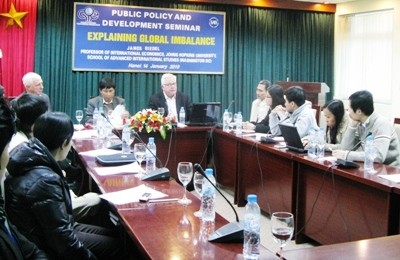“Explaining Global Imbalances” was presented by Prof.Dr. James Riedel, School of Advanced International Studies - Johns Hopkins University at the 7th Public Policy and Development Seminars which was held at University of Economics and Business - VNU on 14th January 2010.
Attending to the seminar were Dean of Faculty of Development Economics and other specialists, domestic and international economic researchers.
Prof.Dr. James Riedel started his presentation by explaining about accounting identities in current account balance (CAB). Until 2000, the world has followed a normal growth path with rich countries saved and developing countries spent to achieve growth. But since 2000, the opposite trend occurred. And the two most striking countries of the two groups are China, which has been saving a lot more recently and the U.S. which has been in huge deficit. In order to explain the current trend, the conventional view is the “global saving glut” (started by Ben Bernanke). This thesis basically started with the undervaluation of the Chinese currency (RMB) which led to capital inflows and reduce in China’s CAB. The speaker questioned this view. Is the RMB undervalued and compared to what? The speaker stated that there is no answer to that question. In fact the RMB appreciated by 20% against the USD instead of devaluating to gain a competitive advantage. But it did use sterilized interventions to prevent the RMB from appreciating. In recent years (since 2003), the fast growth in GDP in China was not achieved by increase in export growth but from the expansion of credit toward SOEs (such as steel industry). The data showed that household sector (not the business sector) has been the main net savers. Chinese government has not been playing a manipulating role in promoting exports but rather China’s CA surplus was unintended.
As for the U.S., the fall in real interest rate was due to fall in inflation expectations and interest rate volatility, and increase capital inflows. Foreign capital flows does have a role but account for at most 30% of total decrease in the U.S. interest rate. US household net saving fell but the main “culprit” is US government spending, mainly on defense. In the speaker’s point of view, US benefited from cheap funding from China for its expenses.
Discussions followed the speaker’s presentation focused on the role of governments, policy instruments in addition to exchange rate policy. The audience elaborated more hypotheses regarding the arguments presented by the speakers. The audience also discussed China’s rural sector, linkages among sectors and strategies for growth.

Many spcialists and researchers contributes their ideas to the seminar